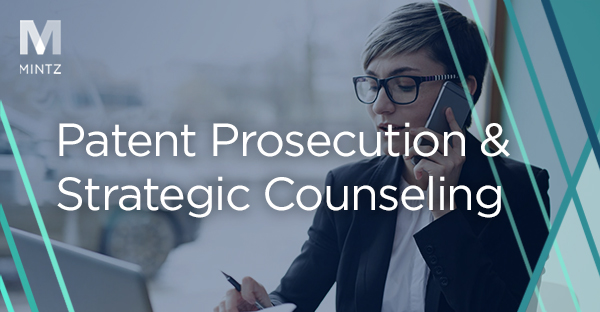
Patent Opinions
Strategic Focus Requires Critical Insights
Strategic use of opinions can provide a significant return on investment — especially when you can leverage great insight early in the development process. We produce both verbal and written patent opinions for our clients. Our attorneys share insights during product development. Help clients assess specific competitor threats and the general landscape. And weigh in before and after product launch.
Share AwardsOur Experience
With clients most sensitive patent matters
 Case Study
Case Study
Our Approach
Mintz uses our deep industry and technology knowledge to our clients’ advantage. With the Halo decision and increasing damage threats in litigation, opinion requests are on the rise again. Our understanding of the industries in which our clients compete enables us to view patents within a more fulsome context — allowing us to provide insights into the impact of competitor patents and products, and our clients’ own product development and launch plans. We conduct comprehensive reviews and analysis from the macro market level to the micro claims level. And we deliver our opinion in the form most helpful to our client in each instance.
- Patentability – Has anyone previously disclosed elements of your innovation?
- Freedom to operate – Are there similar patents already in force?
- Validity – Does a patent meet all legal standards, and is it enforceable?
- Noninfringement – Does your product infringe an existing patent?
Patent opinions should be viewed through multiple lenses. From a patent prosecution perspective, they can inform a go or no-go decision process when developing a new product or enhancing an existing one. In patent litigation, they can be used as a means to demonstrate the care taken in product development — and the efforts made to avoid infringement.
The 2007 Seagate decision by the Federal Circuit Court had set the “objectively reckless” standard in determining whether infringing behavior warranted enhanced damages. In Halo, the Supreme Court loosened that standard, replacing the “objectively reckless” requirement with a “subjective willfulness” standard “without regard to whether ... behavior was objectively reckless.” In multiple cases, courts have looked to opinion letters in determining whether to assess enhanced damages.
What Our Clients Are Saying
Meet Mintz
Our team's bicoastal bench includes attorneys with deep technical knowledge and insight into USPTO decision-making that enables us to provide valued insights to clients.
Our Insights
Viewpoints

Best Practices for Clearances and Opinions
March 31, 2021| Blog










